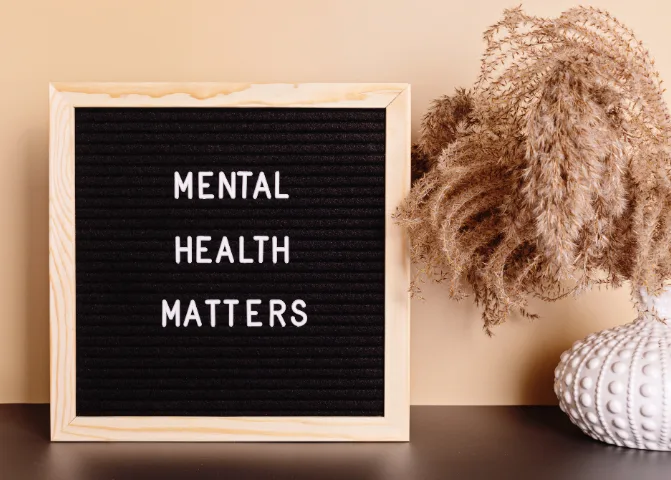Mental health is a critical aspect of our overall well-being, yet it’s often overlooked or misunderstood. Think about it this way: your mental health is the foundation of your life. It impacts how you think, feel, and function. With the increasing demands of modern life, maintaining mental health can be challenging, but it’s essential for leading a fulfilling and balanced life. In this post, I’ll explore various ways to improve mental health, and by the end, you’ll have practical strategies to incorporate into your daily routine to boost your mental well-being.
Key Takeaways
- Mental health influences how we think, feel, and act, affecting our ability to handle stress, relate to others, and make decisions.
- Poor mental health can lead to severe physical health issues, such as heart disease, diabetes, and a weakened immune system.
- The best ways to improve mental health include making social connections, eating a balanced diet, talking to someone, staying positive, practicing gratitude, getting restful sleep, and practicing mindfulness and meditation.
- Working with a therapist can be also an especially efficient way to improve one’s mental health.
- You can seek professional help at any moment. You don’t need to have depression, anxiety, or any specific mental health symptoms to benefit from therapy.
What is Mental Health?

Mental health encompasses our emotional, psychological, and social well-being. It influences how we think, feel, and act, affecting our ability to handle stress, relate to others, and make decisions. Good mental health is not merely the absence of mental illness but a state of well-being where an individual can realize their potential, cope with normal life stresses, work productively, and contribute to their community.
The importance of mental health cannot be overstated. According to the World Health Organization (WHO), one in four people in the world will be affected by mental or neurological disorders at some point in their lives. Currently, around 450 million people suffer from such conditions, placing mental disorders among the leading causes of ill health and disability worldwide.
Why Mental Health Matters

Why should we prioritize mental health? The answer is simple: it affects every aspect of our lives. Poor mental health can lead to severe physical health issues, such as heart disease, diabetes, and a weakened immune system. It can impair our ability to perform at work or school, maintain relationships, and enjoy life.
In my early twenties, I experienced a period of severe anxiety. I struggled to get out of bed, attend classes, or even socialize with friends. It wasn’t until I sought help and made conscious efforts to improve my mental health that I began to see changes. This journey of mine highlighted the profound impact mental health has on every facet of life.
Read Also: What Causes Poor Mental Health?
Ways to Improve Mental Health

Improving mental health involves a multifaceted approach, combining lifestyle changes, professional help, and self-care strategies. Here are the best ways to improve mental health, each backed by research and personal experience.
#1. Make Social Connection
Phone calls and social media have their uses, but few things can compare to the stress-relieving, mood-boosting impact of genuine face-to-face contact with others, particularly those you care about and who energize you. COVID-19 substantially curtailed this chance for several years, but as restrictions are gradually lifted, now may be a good moment to rebuild safe in-person relationships.
#2. Eat Balanced Diet
Nutrition plays a crucial role in mental health. Diets rich in fruits, vegetables, whole grains, and lean proteins can improve brain function and mood. Omega-3 fatty acids, found in fish and flaxseeds, are particularly beneficial for mental health.
I noticed a marked improvement in my mental clarity and mood when I started eating more whole foods and cutting out processed sugars.
#3. Talk to Someone
Talk to a friendly face. If you have challenges, stresses, or worries, talking about them with someone who cares is one of the most effective ways to improve your nervous system and mental health. And vice versa: Listening to others in a safe and supportive environment can help you gain broader insights. It is crucial that both parties feel comfortable sharing and listening to each other’s thoughts, and if the worries are beyond this, consider speaking to a professional.
#4. Staying Positive
You must try to maintain a positive attitude; some strategies to do this include:
Creating a balance between positive and negative emotions. Staying positive does not imply that you never experience unpleasant emotions like anger or sadness. It would help if you felt them to get through challenging situations. They can assist you in responding to a problem. However, you don’t want your emotions to take over. For example, it is counterproductive to dwell on negative events from the past or to be overly concerned about the future.
Taking a vacation from the terrible information. Determine when to stop viewing or reading the news. Use social media to reach out for support and feel connected to others but be careful. Don’t fall for rumors, get into arguments, or negatively compare your life to others.
#5. Practice Gratitude
Practicing gratitude entails being thankful for the positive things in your life. It’s beneficial to do this every day, either by thinking about what you’re thankful for or writing it down in a notebook. These can be large things, such as the support you receive from loved ones, or tiny little things, such as eating a delicious meal. It’s crucial to take the time to appreciate that you had a pleasant experience. Practicing gratitude might help you see your life from a different perspective. For example, while you are anxious, you may not notice that you are also experiencing happy emotions. Gratitude can help you recognize them.
#6. Get Restful Sleep
Sleep is not only essential for your physical health. It also has a significant impact on mental health.
One 2021 studyTrusted Source included data from 273,695 adults in the United States. The researchers discovered that persons who got 6 hours or less of sleep per night were 2.5 times more likely to experience frequent mental distress than those who got more than 6 hours of sleep.
Disrupted sleep may contribute to mental health issues. With a sleep disorder, it can be more difficult to develop healthy sleep patterns on your own. If you believe your sleeping problems may be related to a sleep condition, a sleep specialist can provide more information about useful evidence-based therapies, such as cognitive behavioral therapy for insomnia.
#7. Practice Mindfulness and Meditation
Mindfulness practices, such as meditation and yoga, can reduce stress and enhance emotional regulation. Regular mindfulness practice has been shown to decrease symptoms of anxiety and depression. Personally, starting my day with a 10-minute meditation session helped me stay centered and calm, even during stressful times.
#8. Focus on the Present
Paying attention to the present moment or your senses might be beneficial. This is frequently referred to as mindfulness. Meditation and breathing exercises are two ways you could use them. Alternatively, you can practice mindfulness by paying more attention to your senses while doing everyday tasks, such as washing dishes or eating.
It has been shown that focusing on the present time might help people become more aware of their thoughts and emotions. This means that rather than feeling overwhelmed, you may find it simpler to manage your emotions.
#9. Create a Self-care Kit
It may be helpful to compile a list of resources that can assist you when you are struggling. A self-care kit is stocked with things that often comfort and help you relax. For example, you could include your favorite book, pictures, or photos, a stress ball or fidget toy, and a comforting blanket or slippers.
Alternatively, you might create a digital self-care kit using your phone. You can save pictures, music, videos, messages, or quotes that you find useful. Alternatively, keep notes to remind me how to handle challenging situations.
#10. Seek Professional Help
Seeking help from mental health professionals, such as therapists or counselors, can be a crucial way to improve your mental health. They can provide coping strategies, support, and medication if needed. According to the American Psychological Association, therapy is effective in treating a wide range of mental health issues.
Therapy was a game-changer for me. Having a safe space to talk about my feelings and receive professional guidance made a significant impact on my recovery.
Watch the video below for eight relaxation tips to help you look after your mental well-being.
Additional Tips for Mental Well-being

#1. Join a class or group
Learning a new skill in a group can be entertaining and increase your confidence. To find out what’s going on in your region, contact your local Mind. Ask at your local library or community center.
#2. Try online learning
You may also be able to learn new skills and join clubs online. This could be a fantastic choice if you find it difficult to go out.
#3. Try to do something creative
You could find it beneficial to do something artistic, such as sketching, photographing, or baking. This can help in distracting you from difficult thoughts or feelings. It can also assist you in better understanding yourself or safely communicating difficult feelings. Being creative can be calming.
#4. Spend time in nature
Spending time in nature might help boost your mood and lessen stress and aggression. The information on nature and mental health has more about the benefits and lots of ideas you could try.
#5. Bring nature indoors
This allows you to enjoy the benefits of nature without needing to visit a park or public garden. You can try listening to birdsong, looking at animal pictures, or watching nature outside your window.
You could buy flowers, potted plants, or seeds to plant on your window sill. Alternatively, you can gather natural things from the outdoors, such as leaves, flowers, or feathers, and use them to adorn your home.
#6. Spend time with the animals
Some people believe that being among animals is calming and enjoyable. You could try pet-sitting or dog walking, feed birds from your window, or visit a local community farm.
#7. Try peer support
If you’re having difficulty, talking to others who share your feelings or experiences can be another way to improve your mental health. This could happen in person at a peer support group or online, such as Mind’s Side by Side.
#8. Find ways to make a difference
Helping others can be a way to improve our mental health. You could find ways to help a cause that is important to you. For example, you can show your support by signing petitions, donating to charity shops or food banks, or posting on social media.
You could also strive to perform little acts of kindness for people you know or strangers. This could include things like holding a door open for someone, preparing a cup of tea, or leaving a positive comment or review online.
#9. Volunteer
Using your time to help others can offer you a feeling of purpose, allow you to meet new people, and enhance your confidence. Learn more about helping with Mind or visit the Volunteer by Do It page for volunteer options.
#10. Look after yourself
Brushing your teeth and showering are both beneficial to your physical health. And they can make you feel better. If you’re struggling, try to set yourself small goals or just do what you can.
#11. Think about your drug and alcohol use
Substance addiction can exacerbate mental health issues. Limiting alcohol use and avoiding drugs can help you retain mental clarity and emotional stability. Cutting back on drinking greatly improved my mood swings and overall emotional stability.
When to Reach Out for Help

The practices listed above can help improve mental health, but they cannot “cure” any mental health condition. To put it another way, changing your habits may not necessarily help persistent mental health issues. However, working with a therapist can be an especially efficient way to improve one’s mental health.
You can seek professional help at any moment. You don’t need to have depression, anxiety, or any specific mental health symptoms to benefit from therapy.
However, reaching out becomes especially vital if:
- If you have had a stressful or traumatic event,
- You feel more anxious, unhappy, or depressed than normal.
- Your motivation has tanked
- You’ve noticed changes in your appetite and sleep patterns
- You often find it difficult to get through the day
- You feel stuck or overwhelmed
- You’re using alcohol or other substances more than usual or turning to other unhelpful coping behaviors
Your mental health significantly influences your quality of life. Many of the factors that can affect mental health are outside your control, but incorporating positive habits into your daily routine can improve overall mental health.
Conclusion
Improving mental health is a continuous journey that requires a holistic approach. By making use of these strategies in your daily life, you can improve your mental health and lead a more fulfilling life. Remember, it’s essential to seek professional help if you need it and to reach out to your support network.
So, what steps will you take today to improve your mental health? Share your thoughts and experiences in the comments!
Related Articles
- Top 7 Mental Health Summer Camps for Raising Resilient Kids
- Why is it Important to Take Care of Your Mental Health
- How to Prevent Mental Health Problems
- What are the 7 Risk Factors for Mental Health?
- How Exercise Improves Mental Health + Free PDF
- How Does Cyberbullying Affect Mental Health? Evidence-Based






